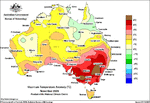Well, CO2 is not "pollution" - it is a trace gas that is vital for virtually all life on earth. It is a very minor greenhouse gas compared to say, water vapour, which accounts for the vast majority of the greenhouse effect. The relationship between CO2 and the warming effect of CO2 is logarithmic not linear - a doubling of the atmospheric concentration of CO2 does not lead to a doubling of the warming effect of CO2.
Leaving these CO2 facts aside, I always feel slightly disturbed when anyone brings up the "too many people" argument. Perhaps it is the astonishing lack of reason behind the argument - the greatest resource on earth is not oil or any other substance, it is man.
Perhaps it is the faint whiff of leftist patrician racism (the kind that hangs around the US Democrats, the sort of thing that Barbara Boxer specialises in - "What do you mean you disagree? Another black man has just told me that he agrees!" etc etc).
After all, which populations are actually increasing? Is it the death-bed demographic states of the EU, many of whose native populations are reproducing at far below replacement rate? Or the Japanese? Or American WASPs? No, when people talk about overpopulation, and the responsibility not to overburden the planet with humans, they are talking about brown humans. Brown humans having too many babies and, thanks to advances in medicine, farming and other areas, as well as increasing global capitalism, living a bit too long as well.
This is vile and disgusting. A key part of the AGW worldview (although one that is rarely explicitly stated) is one that looks with horror on the prospect of billions in the third world starting to enjoy something approaching Western standards of living.
It also makes very little sense. Population growth is slowing everywhere (and as noted above, in some areas it is already well into reverse - look at the birth rates for the inigenous populations of Russia, Japan, Spain and Italy, for example). This applies across the world and is one of the reasons that population forecasts are continually being revised downwards. Not so long ago it was 12 billion - now it is 9. This is because lower birth rates go hand in hand with greater prosperity.
But these are not the worst things about it. Illogical, racist, unpleasant, nonsensical - these things are objectionable and ridiculous, but not actually dangerous. However, the tyranny implicit in population control most certainly is dangerous.
People are beginning to speak thus of, for example, the One Child policy: "Well, you know, it does help to limit CO2 emissions". As would mass murder, a natural and almost unavoidable consequence of that policy.
If you are personally concerned about overpopulation, limit your own procreation. If this is insufficient for you, there is at least one further step you can take. But please don't advocate a policy that is to the great detriment of the poorest members of the human race.

